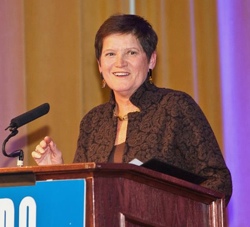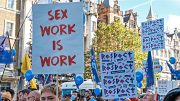By: Rebecca Haag*–
The AIDS epidemic has raged for 30 years. But the prospect of ending it has never looked brighter. Science is driving toward better treatments. Health care reform is being implemented around the country. And President Obama has set concrete goals and a timeline to reduce new infections by half in the United States through his National HIV/AIDS Strategy.
That is one of the reasons why the theme of this year’s World AIDS Day, which takes place Saturday, Dec. 1, is “Getting To Zero.”
Today, we see less than 650 new HIV diagnoses annually in Massachusetts. In fact, new diagnoses of HIV have been reduced by 54 percent since 1999, which means that nearly 6,000 people who might otherwise have become HIV positive have remained negative.
How did we do this?
Access to health care: We are the first state in the country to institute health care reform that has seen nearly everyone living in the state getting access to health care insurance, and health care.
Another factor is that over the last three decades, AIDS service organizations have built a sophisticated model of community-based support services for those living with HIV, making it easier for them to focus on their health.
Finally, our state has been committed to evidence-based behavioral interventions like needle exchange programs, pharmacy access, and condom distribution to those most at risk of infection.
But if we want to get to zero and end the epidemic, we have to finish the job.
The critical question we face today is whether we can muster the political support to fund the work that still needs to take place to end the transmission of HIV.
In this past year, one-quarter of the state’s HIV/AIDS prevention budget was cut as a result of federal reductions to states like Massachusetts where HIV diagnoses have been steadily declining. And state HIV/AIDS funding has been on a consistent downward trajectory over the last decade from just under $52 million in 2000 to just over $32 million today.
Public funding should not punish those who are successful, but reward them. Now is the time to invest in ending the epidemic, not retreat from it. If we don’t stay committed, we lose our chance to beat it once and for all.
Today, as was true 30 years ago, gay and bisexual men remain particularly vulnerable to HIV infection. They are at least 44 times more likely to become HIV positive than the general population. Gay and bisexual men of color are even more at risk, with younger gay and bisexual men of color at the highest risk. Meanwhile, the US Centers for Disease Control estimates that more than one-quarter of transgender women are HIV positive.
So how do we get to zero?
- Test those most at risk and connecting them to care and treatment.
- Increase access to health care for everyone living with or at risk of HIV/AIDS, particularly those from historically underserved communities.
- Provide critical community-based support services to ensure better health outcomes and integrate these services into community health-care settings.
- Advocate for strong public policy that protects those living with HIV from stigma and discrimination and educate those at risk with culturally competent public education and awareness campaigns.
- Address the underlying causes that drive HIV like racism, homophobia, sexism, drug addiction, and poverty and seek social justice for all.
We can get to zero. We can end this epidemic in our lifetimes and on our watch.
On World AIDS Day, take a moment to think about what you can do to help stop the epidemic. Get tested. Talk to your kids about safe sex and drug use. Call a friend who is infected and tell them that you care. Encourage a friend to get tested. A simple act of kindness could save a life.
*Rebecca Haag is the President & CEO of AIDS Action Committee of Massachusetts. Visit AAC.org for a listing of World AIDS Day-related events.








